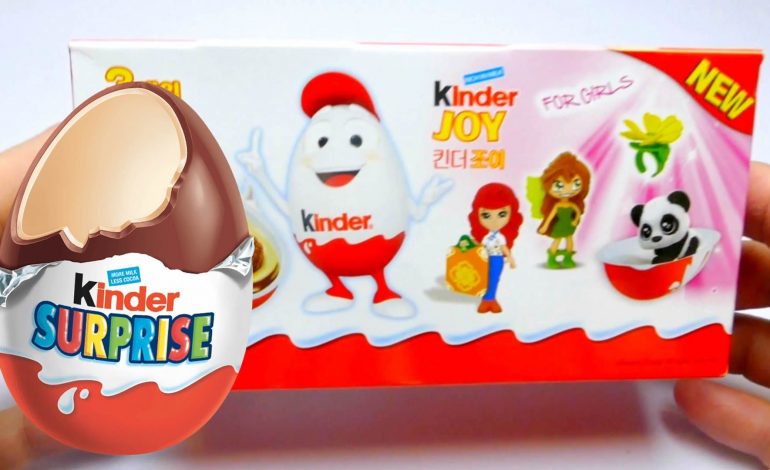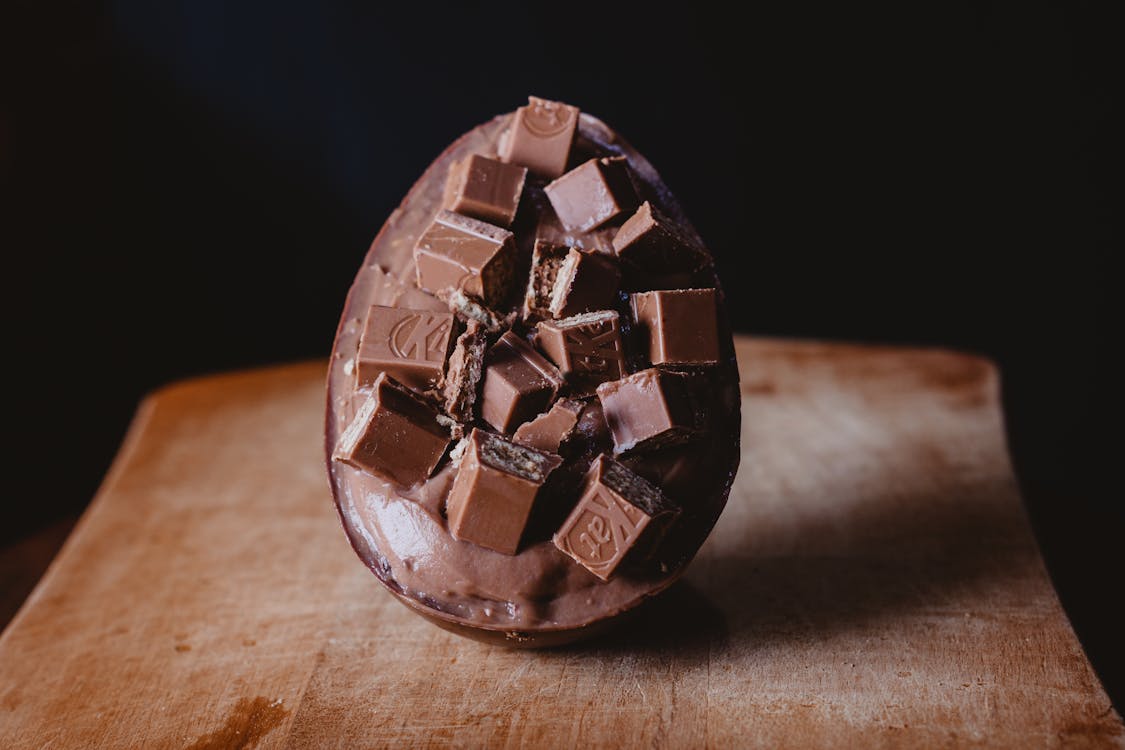
Why kinder Joy withdrawn from the market in Indonesia?
![]()
What is Kinder chocolate?
The first Kinder chocolate variety launched by the Ferrero Group was Kinder Chocolate in 1968. Kinder chocolate was then increasingly diverse with the emergence of Kinder Surprise products in 1974.
Both adults and kids love the egg-shaped treat known as Kinder Surprise. It is also one among the many chocolate products Ferrero introduced under the Kinder brand. This sweet features a hollow egg-shaped layer of milk and cocoa chocolate. This chocolate in the shape of an egg is protected by a thin metal foil. A yellow capsule is located inside the hollow chamber. This was created to resemble an egg yolk. This capsule has a surprise toy inside. Thus, the edible component contains the toy. It is better to consume Kinder Surprise in colder temperatures since it cannot be restricted from melting chocolate. It is ideal to consume Kinder Surprise in colder temperatures since it cannot be restricted from melting chocolate.
Another Easter-inspired treat in the shape of an egg is Kinder Joy. One of the few confectioneries with a friendlier brand introduced by the Italian business Ferrero is this product. It comes in a plastic package that separates into two halves. Two crunchy balls and a coating of milk and dark chocolate, together with the edible section, are present on half of it. The chewy balls give the already fantastic chocolate flavor even more crunch. The spoon is on the outside and a surprise toy is hidden within the other half.
Kinder Joy withdrawn from UK market.
On April 2, 2022, the UK FSA issued a public warning regarding the voluntary recall of Kinder Surprise brand chocolate products due to suspected contamination with Salmonella (non-thypoid) bacteria. The bacteria have caused mild symptoms in children in the form of diarrhea, fever, and stomach cramps. The victims affected were 63 children, but they did not cause death. The recalled product is a Kinder Surprise brand chocolate product in a single package of 20 grams and a pack of 3 @ 20 grams, with an expiration date of 7 October 2022. As a precaution, the product recall was expanded by adding several variants, namely Kinder Surprise in 100 gram packaging, Kinder Mini Eggs in 75 grams, Kinder Egg Hunt Kit in 150 grams, and Kinder Schokobons in 200 grams with expiration dates 20 April 2022 – 21 August 2022. All Kinder chocolate products are produced by Ferrero N.V/S.A in Belgium. All of the recalled Kinder brand chocolate products mentioned above are not registered with the POM.

Kinder Joy withdrawn from Indonesia market.
Quoting from Kompas.com, Kinder Joy was officially withdrawn from circulation in Indonesia in April 2022. At that time, this step followed the withdrawal of Kinder Joy products in various countries in Europe. The decision to withdraw Kinder Joy in Indonesia was announced by the Food and Drug Supervisory Agency (BPOM) on Monday (11/4/2022). Kinder chocolate products in Indonesia are withdrawn even though the brand is different from the Kinder chocolate brand circulating in a number of countries in Europe. BPOM-registered Kinder products originate from India and are manufactured by Ferrero India PVP, LTD.
What is Salmonella in Kinder product?
Salmonella is a bacterium belonging to the Enterobacteriaceae family. Salmonella is a hardy bacterium that can be found anywhere and can survive from a few weeks in a dry environment to several months in water. All Salmonella serotypes can cause disease in humans, but some are host specific and can only live in one or a few animal species. Salmonella causes salmonellosis or Salmonella infection. Salmonella is one of the pathogenic or disease-causing bacteria that can contaminate food products. Salmonella is generally found in animal foods, such as chicken meat, eggs, and milk. Most likely Kinder Joy can be contaminated with Salmonella from the milk used as one of the raw materials. If a person consumes food products contaminated with Salmonella, that person will experience an infection called
Salmonellosis.
This disease is characterized by symptoms of digestive disorders such as diarrhea, vomiting, fever, headache, and stomach cramps. Generally these symptoms appear after 8-72 hours after infection and can occur for 4-7 days with a risk of death for victims who experience advanced infection. According to BPOM Regulation No. 13 of 2019 concerning the Maximum Limit of Microbial Contamination in Processed Food, all food products must not contain Salmonella per 25 mL or 25 mg of product. The strictness of this provision is one indication of how dangerous the effects of Salmonella are for health.
How Salmonella bacteria contaminate Kinder product?
Salmonella includes mesophilic bacteria, namely bacteria that grow at a temperature of 25 °C to 40 °C with optimum growth at a temperature of 25 °C to 37 °C. Therefore, heating is a critical point for food safety to prevent Salmonella contamination in food products.
Salmonella can be inactivated by pasteurization with minimum heating conditions at a temperature of 63 °C for 30 minutes or 71.5 °C for 15 seconds. In addition to killing pathogenic microorganisms such as Salmonella, the pasteurization process can also kill spoilage microorganisms and inactivate enzymes.
As a result, pasteurized food products have a longer shelf life. To determine the adequacy of the pasteurization process, an evaluation of the pasteurized product must be carried out.
As in the pasteurization process of milk, the adequacy of the pasteurization process can be evaluated by a phosphatase test. If the phosphatase enzyme in milk is no longer
active, it can be concluded that the pasteurization process has succeeded in inactivating microorganisms. This happens because pathogenic microorganisms are more sensitive to heat than the phosphatase enzyme.
Based on the explanation above, Kinder Joy can be contaminated with Salmonella from the milk used because the pasteurization process has not been able to inactivate the bacteria.
List of countries that withdrawn Kinder products from market The Belgian food safety authority (AFCA) has also ordered the recall of all Kinder products made at the factory in Arlon, which is owned by Ferrero. Besides Belgium, Kinder chocolate products are also recalled in the UK, France, Germany, the Netherlands and Sweden. Ferrero is also recalling some of its Kinder
chocolates from stores in the US due to potential salmonella contamination. Some Kinder chocolates have also been recalled in parts of Asia, including Hong Kong and Singapore.
Kinder Joy Tested Negative
The Kinder chocolate variant which was withdrawn from the market by the UK and other countries is the Kinder Surprise which is produced by the Kinder factory in Belgium, while the Kinder variant circulating in Indonesia is the Kinder Joy which is produced by the Kinder factory located in India.
According to what BPOM stated for Liputan 6, the sampling was done at random while taking into account regional representation and risk analysis of Kinder Joy, Kinder Joy for Boys, and Kinder Joy for Girls chocolate goods that were registered in Indonesia. The outcomes of the lab examinations revealed that the three goods were deemed free of Salmonella infection.
In the past, BPOM removed Kinder Joy from the market out of concern that the well-liked product could have been tainted with Salmonella, as was the case in numerous
European nations including Belgium and England, where it was claimed that many children contracted the illness.
According to the most recent data from the International Food Safety Authorities Network Global Alert (INFOSAN), Kinder brand chocolate goods from Belgium were sold in 77 different countries as of April 10, 2022, according to BPOM. The Kinder Joy batch listed with BPOM does not, however, include goods that have been recalled elsewhere. As on the declaration that the Kinder Joy items tested were clear of Salmonella germs, BPOM thus informs that these products may be resold in Indonesia. Additionally, CLICK (Check Packaging, Label, Distribution Permit, and Expiration) should always be performed before purchasing or ingesting food goods, according to BPOM.
Baca juga:
Penarikan Haagen-Dazs: vanila ekstrak terkontaminasi EtO.
Sources:
BBC





